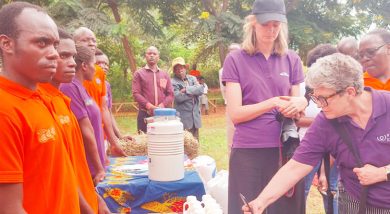Unicef urges Malawi to step up neonatal healthcare in 2018
The United Nations Children’s Fund (Unicef) has challenged the Malawi government to introduce safety measures to ensure newborns survive their first days of life.
Unicef country representative Johannes Wedenig made the appeal in a press statement released on Sunday ahead of Monday’s celebrations marking the entry into 2018.

“This New Year, [our] resolution is to help give every child more than an hour, more than a day, more than a month—more than survival. We call on government and partners to join the fight to save millions of children’s lives by providing proven, low-cost solutions,” he said.
This comes ahead of the UN agency’s launch of a global campaign called Every Child Alive later this month to demand and deliver affordable, quality healthcare solutions for every mother and newborn.
The initiative also demands a steady supply of clean water and electricity at health facilities, the presence of skilled health attendants during birth and breastfeeding within the first hour after birth.
Unicef projected that nearly 390 000 babies would be born on New Year’s Day. The statement adds that over 90 percent of these babies would be born in less developed regions such as Malawi but some will not make it past their first day.
Adds Widenig: “We are now entering the era when all the world’s newborns should have the opportunity to see the 22nd century. Unfortunately, nearly half of the children born this year likely won’t. A child born in Sweden in January 2018 is most likely to live to 2100, while a child from Malawi would be unlikely to live beyond 2075.”
Statistics from the UN health agency show that in 2016, an estimated 2.6 million children died before the end of their first month, and that over 80 percent of them died from treatable causes such as premature birth, complications during delivery, and infections like sepsis and pneumonia.
Despite unprecedented progress in child survival which includes halving the number of children worldwide who die before their fifth birthday to 5.6 million in 2016, Unicef still bemoans slower progress for newborns.
Meanwhile, World Health Organisation (WHO) figures show that babies dying in the first month account for 46 percent of all deaths among under-five children.
A recent survey by Malawi’s Health Donors Group showed that the country’s maternal and new-borns (neonatal aged between zero and 28 days) mortality rates remain among the highest in sub-Saharan Africa despite efforts to improve the situation.
In an earlier interview, Ministry of Health (MoH) director of planning and policy development Emma Mabvumbe said Malawi’s maternal mortality rate is estimated at 439 per 100 000 live births as per 2010 statistics whereas neonatal mortality stood at 27 per 100 000 live births.





